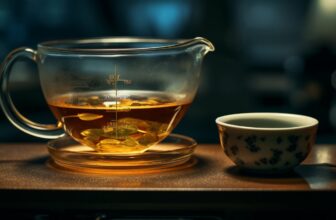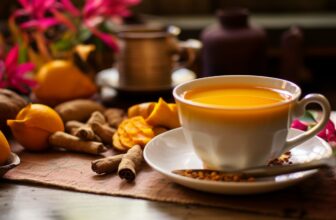
Are you curious about how to use bee pollen in tea? Look no further! In this comprehensive guide, I will walk you through the simple steps of adding this nutrient-rich superfood to your favorite beverage.
Key Takeaways:
- Bee pollen is a nutrient-rich superfood with potential medicinal benefits.
- It can be incorporated into tea by adding it to hot water or mixing it with honey.
- Bee pollen can also be used in smoothies, water, soap, and baking.
- Start with a small dose and consult a healthcare professional before adding bee pollen to your diet.
- Choose reputable suppliers with ethical sourcing practices for quality and safety.
What is Bee Pollen?
Before we dive into the process of adding bee pollen to your tea, let’s first understand what bee pollen is and how it can benefit your health. Bee pollen is a nutrient-rich superfood that is collected by bees from flowering plants. It is often referred to as nature’s multivitamin due to its impressive nutritional profile. Bee pollen is composed of carbohydrates, proteins, vitamins, minerals, antioxidants, and enzymes, making it a powerhouse of health-promoting compounds.
The benefits of bee pollen are vast. It has been hailed for its potential to boost immunity, support wound healing, and provide protection against free radicals. Many people also incorporate bee pollen into their diet for its potential anti-inflammatory and antioxidant properties. It is no wonder that bee pollen has gained popularity as a natural health supplement.
To use bee pollen in tea, simply add it to hot water or mix it with honey before adding it to your tea of choice. Be sure not to heat the bee pollen directly, as it may destroy the delicate enzymes and reduce its effectiveness. In addition to tea, bee pollen can be used in various other ways, such as in smoothies, water, soap, and baking, to enjoy its health benefits.
It is important to note that bee pollen may not be suitable for everyone. It is recommended to start with a small dose and consult a healthcare professional before incorporating bee pollen into your diet, especially if you have pollen or bee sting allergies, are pregnant or breastfeeding, or are taking blood thinners. Additionally, it is crucial to choose reputable suppliers with ethical sourcing practices to ensure the quality and safety of the bee pollen you consume.
Health Benefits of Bee Pollen Tea
Adding bee pollen to your tea not only enhances its flavor but also provides a range of health benefits that can boost your overall well-being. Bee pollen is a nutrient-rich superfood that is packed with vitamins, minerals, antioxidants, and amino acids. When consumed in the form of tea, it can support your immune system, aid in wound healing, and protect your body against free radicals.
One of the key health benefits of bee pollen tea is its ability to improve immunity. The antioxidants present in bee pollen help strengthen the immune system, making it more resilient to infections and diseases. Regular consumption of bee pollen tea can also help speed up the healing process for wounds and injuries due to its antibacterial and anti-inflammatory properties. Furthermore, the antioxidants in bee pollen tea act as scavengers, neutralizing harmful free radicals and protecting your cells from oxidative damage.
To incorporate bee pollen into your tea, simply add it to hot water or mix it with honey before adding it to your favorite blend. You can also explore other creative ways to use bee pollen, such as incorporating it into smoothies, water, soaps, or even baked goods. However, keep in mind that bee pollen should not be heated, as it may destroy the delicate enzymes and reduce its effectiveness.
Summary of Health Benefits:
- Enhances immunity and strengthens the immune system.
- Facilitates wound healing and has antibacterial properties.
- Protects against free radicals and oxidative damage.
As with any new dietary addition, it is important to start with a small dose of bee pollen and gradually increase it over time. It is also advisable to consult a healthcare professional, especially if you have pollen or bee sting allergies, are pregnant or breastfeeding, or are taking blood thinners. Choosing high-quality bee pollen from reputable suppliers with ethical sourcing practices is crucial for ensuring its safety and effectiveness.
| Precautions | Recommended Dosage |
|---|---|
| Consult healthcare professional for allergies or medical conditions | Start with small dose, gradually increase |
| Avoid if pregnant or breastfeeding | Safe dose varies, consult healthcare professional |
| Take caution if on blood thinners | Consult healthcare professional for possible interactions |
How to Incorporate Bee Pollen into Tea
Now that you’re familiar with the benefits of bee pollen tea, let’s get into the nitty-gritty of incorporating it into your daily tea routine. Adding bee pollen to your tea is a simple and effective way to enjoy its nutrient-rich goodness. Here’s a step-by-step guide on how to prepare a bee pollen infused tea:
- Start by brewing a cup of your favorite tea, whether it’s green tea, herbal tea, or black tea.
- Once your tea is ready, take a teaspoon of high-quality bee pollen granules. Make sure to choose bee pollen from reputable suppliers with ethical sourcing practices to ensure its quality and safety.
- You can either add the bee pollen directly to your hot tea or mix it with honey before adding it to the tea for added sweetness. Stir well until the bee pollen is fully dissolved.
- Sit back, relax, and enjoy your delicious bee pollen infused tea. You can savor it hot or let it cool down and enjoy it as an iced tea.
Remember, bee pollen is a delicate superfood that should not be heated as it may destroy its delicate enzymes and reduce its effectiveness. So make sure to add the bee pollen to your tea after it has slightly cooled down.
Adding bee pollen to your tea not only enhances its flavor but also boosts its nutritional value. So go ahead and give it a try to enjoy the numerous health benefits of bee pollen in a warm and comforting cup of tea.
Other Uses for Bee Pollen
While bee pollen tea is a popular choice, there are numerous other ways to incorporate bee pollen into your daily life for maximum health benefits. Whether you’re looking to boost your immune system, enhance your skincare routine, or add a nutritional punch to your favorite recipes, bee pollen has got you covered.
Smoothies: Start your day with a nutritious kick by adding a tablespoon of bee pollen to your favorite smoothie recipe. It not only adds a subtle sweetness but also provides a wealth of vitamins, minerals, and antioxidants.
Water: Infuse your water with the goodness of bee pollen by adding a few granules to a glass of water. This not only enhances the flavor but also provides a refreshing and hydrating boost, perfect for those hot summer days.
“Bee pollen is nature’s multivitamin, packed with essential nutrients and enzymes that support overall health and vitality.”
– Emma, Nutritionist
| Soap: | Experience the nourishing benefits of bee pollen by using it in homemade soap. It can help soothe and moisturize the skin, leaving it feeling soft and supple. |
|---|---|
| Baking: | Add a sprinkle of bee pollen to your favorite baked goods, such as muffins or granola bars, for an extra nutritional boost and a subtle floral flavor. |
It’s important to note that bee pollen should not be heated, as it may destroy the delicate enzymes and reduce its effectiveness. To preserve its nutritional value, it’s best to add bee pollen to dishes or beverages that are served at room temperature or chilled.
Before incorporating bee pollen into your routine, it’s advisable to start with a small dose and gradually increase it to gauge your body’s response. It’s also important to consult a healthcare professional, especially if you have pollen or bee sting allergies, are pregnant or breastfeeding, or are taking blood thinners.
Bee Pollen: A Natural Superfood
Bee pollen is a nutrient-rich superfood that offers a wide range of health benefits. It can support immune function, enhance wound healing, and provide protection against harmful free radicals. With its versatility and numerous uses, bee pollen is a valuable addition to any healthy lifestyle.
Recommended Dosage and Safety Precautions
It’s important to approach the consumption of bee pollen tea with caution and take necessary safety precautions to ensure your well-being. While bee pollen is a nutrient-rich superfood with potential health benefits, it may not be suitable for everyone, especially those with pollen or bee sting allergies, individuals who are pregnant or breastfeeding, or those taking blood thinners. Consulting a healthcare professional is strongly advised before incorporating bee pollen into your diet.
When starting, it’s recommended to begin with a small dose of bee pollen and gradually increase it over time. This allows your body to adjust and helps you assess any potential allergic reactions or side effects. Some individuals may be more sensitive to bee pollen than others, so it’s important to listen to your body and stop consuming it if you experience any adverse reactions.
To ensure you’re getting high-quality bee pollen, it’s important to choose reputable suppliers with ethical sourcing practices. Look for products that have been tested for purity and are free from contaminants. This helps ensure that the bee pollen you’re consuming is safe and of the highest quality.
Take note of these tips when consuming bee pollen:
- Start with a small dose and gradually increase it over time.
- Monitor your body for any allergic reactions or side effects.
- Consult a healthcare professional before adding bee pollen to your diet, especially if you have allergies, are pregnant or breastfeeding, or are taking blood thinners.
- Choose reputable suppliers with ethical sourcing practices to ensure the quality and safety of the bee pollen.
| Side Effects | Precautions |
|---|---|
| Allergic reactions | Avoid bee pollen if you have pollen or bee sting allergies. |
| Interactions with medications | Consult a healthcare professional if you are taking blood thinners. |
| Unsafe for pregnant or breastfeeding women | Avoid bee pollen if you are pregnant or breastfeeding. |
| Unsafe for infants and young children | Bee pollen is not recommended for infants and young children. |
By following these dosage recommendations and safety precautions, you can enjoy the potential health benefits of bee pollen tea while minimizing any risks. Always prioritize your well-being and make informed decisions when it comes to incorporating new ingredients into your diet.
Choosing High-Quality Bee Pollen
To fully enjoy the benefits of bee pollen tea, it’s crucial to source your bee pollen from reliable suppliers who adhere to ethical practices and maintain high-quality standards. The quality of the bee pollen can greatly impact its effectiveness and safety. Here are some tips to help you choose the best bee pollen for your tea:
- Look for bee pollen that is sourced from pristine environments, away from pollution and pesticides. Organic bee pollen is a good choice as it is generally free from harmful chemicals.
- Check if the bee pollen is sourced from sustainable beekeeping practices. This ensures that the bees are well-cared for and the environment is protected.
- Opt for bee pollen that has been properly processed and stored. The pollen should be dried and stored in airtight containers to prevent contamination and preserve its nutritional value.
- Consider purchasing bee pollen from local beekeepers, farmers’ markets, or reputable health stores. This allows you to support local businesses and have better control over the sourcing and processing methods.
By choosing high-quality bee pollen, you can ensure that you are getting the maximum health benefits from your tea. Remember to store the bee pollen in a cool, dry place and use it within the recommended expiration date for optimal freshness and effectiveness.
| Benefits of Choosing High-Quality Bee Pollen for Tea |
|---|
| 1. Enhanced nutritional value |
| 2. Reduced risk of contamination |
| 3. Better taste and aroma |
| 4. Support for sustainable beekeeping practices |
Bee Pollen Tea: A Perfect Blend of Flavor and Well-being
A cup of bee pollen tea is not only a delightful way to start your day but also a great way to support your overall well-being. The therapeutic properties of bee pollen combined with the soothing warmth of tea create a perfect blend that can energize and rejuvenate your body. Whether you’re a tea enthusiast or simply looking for a natural health boost, incorporating bee pollen into your tea can offer a range of benefits.
“Bee pollen tea is like nature’s supercharged elixir, providing a wealth of nutrients and potential health benefits.” – Dr. Jane Adams, herbalist
When sourcing bee pollen for your tea, it’s important to choose high-quality pollen that is sourced from reputable suppliers. By following these guidelines, you can enjoy the full potential of bee pollen tea and experience the many health benefits it has to offer.
Bee Pollen and Allergies
While bee pollen tea offers incredible health benefits, it’s important to be aware of potential allergenic reactions, particularly for individuals with pollen or bee sting allergies. Although rare, some people may experience allergic reactions, such as itching, swelling, hives, or even anaphylaxis, after consuming bee pollen or products containing bee pollen.
If you have a known allergy to pollen or bee stings, it is advisable to avoid consuming bee pollen tea or any bee pollen products. Even if you have never had an allergic reaction before, it’s still recommended to exercise caution and start with a small dose to test your tolerance.
It’s also crucial to consult with a healthcare professional before incorporating bee pollen into your diet, especially if you have any pre-existing allergies or medical conditions. This is especially important for pregnant or breastfeeding individuals, as well as those taking blood thinners or other medications that may interact with bee pollen.
When purchasing bee pollen for tea, it’s essential to choose high-quality products from reputable suppliers. Look for suppliers that prioritize ethical sourcing practices and ensure their bee pollen is free from contaminants. This will help guarantee the quality and safety of the product you are consuming.
Ultimately, bee pollen tea can be a wonderful addition to your daily routine, providing you with numerous health benefits. However, it’s essential to be mindful of potential allergenic reactions and consult with a healthcare professional before incorporating bee pollen into your diet. By taking these precautions, you can enjoy the benefits of bee pollen tea while minimizing any potential side effects.
Bee Pollen Tea for Specific Health Conditions
Bee pollen tea isn’t just a general health boost; it also has specific benefits for certain health conditions, making it a versatile addition to your wellness routine. Whether you’re looking to boost fertility, improve digestion, or promote weight loss, bee pollen tea can offer natural support for your goals.
For those trying to conceive, bee pollen tea may help enhance fertility by providing essential nutrients like vitamins, minerals, and amino acids. These nutrients are known to support reproductive health and hormone balance, making bee pollen tea a valuable addition to your preconception plan.
In terms of digestion, bee pollen tea can aid in improving gut health and relieving digestive issues such as bloating, gas, and indigestion. This is due to its high fiber content and enzymes that help break down food more efficiently, promoting better absorption of nutrients and easing digestive discomfort.
Additionally, bee pollen tea may assist with weight loss by boosting metabolism and increasing satiety. Its natural energy-boosting properties can also help enhance physical performance during exercise, encouraging a more active lifestyle that supports weight management. However, it’s important to note that while bee pollen tea can be a helpful tool in a weight loss journey, it should be complemented with a balanced diet and regular exercise.
| Health Condition | Potential Benefits of Bee Pollen Tea |
|---|---|
| Fertility | Enhances reproductive health and hormone balance |
| Digestive Issues | Improves gut health and aids digestion |
| Weight Loss | Boosts metabolism, increases satiety, and promotes physical performance |
Integrating bee pollen tea into your daily routine can offer targeted support for specific health conditions, allowing you to harness the full potential of this natural superfood. As always, it’s crucial to consult with a healthcare professional before making any significant changes to your diet, especially if you have underlying health conditions or are taking medications.
Conclusion
In conclusion, adding bee pollen to your tea is a simple yet powerful way to enhance your health and enjoy the numerous benefits this superfood has to offer. Bee pollen is a nutrient-rich superfood that can be consumed in various forms, such as granules, liquid extracts, capsules, and creams. It is known for its potential medicinal benefits, including improved immunity, wound healing, and protection against free radicals.
When incorporating bee pollen into your tea, you have a few options. You can simply add it directly to hot water or mix it with honey before adding it to the tea. It can also be used in other beverages like smoothies and water, and even in products like soap and baked goods. However, it is important to note that bee pollen should not be heated, as it may destroy the delicate enzymes and reduce its effectiveness.
Before adding bee pollen to your diet, it is recommended to start with a small dose and consult a healthcare professional, especially if you have pollen or bee sting allergies, are pregnant or breastfeeding, or are taking blood thinners. It is important to ensure that you choose reputable suppliers with ethical sourcing practices to ensure the quality and safety of the bee pollen you consume.
By incorporating bee pollen into your tea, you can experience the numerous health benefits it offers, such as boosting fertility, improving digestion, and promoting weight loss. So why not give it a try and enjoy a healthier lifestyle with the addition of this extraordinary superfood?
FAQ
Q: What is bee pollen?
A: Bee pollen is a nutrient-rich superfood that can be consumed in various forms, such as granules, liquid extracts, capsules, and creams. It is collected by bees from flowers and is known for its potential medicinal benefits.
Q: How can I use bee pollen in tea?
A: Bee pollen can be easily incorporated into tea by adding it to hot water or mixing it with honey in the tea.
Q: Can I use bee pollen in other ways?
A: Yes, bee pollen can also be used in smoothies, water, soap, and baking.
Q: What are the health benefits of bee pollen tea?
A: Bee pollen tea has various health benefits, including improved immunity, wound healing, and protection against free radicals.
Q: How much bee pollen should I take and are there any safety precautions?
A: It is important to start with a small dose of bee pollen and consult a healthcare professional before adding it to your diet. This is especially important for individuals with pollen or bee sting allergies, those who are pregnant or breastfeeding, or on blood thinners.
Q: How do I choose high-quality bee pollen?
A: It is important to choose reputable suppliers with ethical sourcing practices to ensure the quality and safety of the bee pollen you consume.
Q: Are there any risks for individuals with allergies?
A: Individuals with pollen or bee sting allergies should exercise caution when consuming bee pollen tea and may need to avoid it altogether.
Q: Can bee pollen tea be beneficial for specific health conditions?
A: Yes, bee pollen tea has been associated with various health benefits, including boosting fertility, improving digestion, and promoting weight loss.













